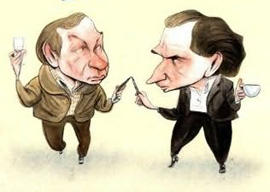
April 06, 2011

Houellebecq and Lévy have a public role, but they are ashamed of it. They neurotically weigh what must go to the private life and what to the public, a contemporary impulse. Was Dante torn between fighting for the Guelphs and writing poetry? Did Goethe worry about favoring his literary career or his official one? Just as much I suspect he worried whether to read in German or in French, to study philosophy or science. They were all part and parcel of a man back then.
Nowadays the public realm is such a poisoned thing that it is not fit for a gentleman to be seen in, so excuses must be made for participating in it. Like men who meet in a brothel, Houellebecq and Lévy give each other reasons for being found there: Houellebecq did it for the money and wanted to sell enough books to quit his day job. “If,” he says, “I had had a small private income, I would certainly have written books (I might well have written more), but I would never have set foot in a television studio.”
Bernard-Henri Lévy does it for the causes, to bring the “forgotten victims” of the “forgotten wars” to the fore in some sort of belief that publicity is life, some Freudian faith that talking about things will cure them. For his part, Houellebecq is a religious as well as a political atheist.
The letters soar when Houellebecq and Levy talk about literature, poetry, Baudelaire, and Aragon”what joins rather than separates them. There are even some truly rousing pages by BHL about his double passion for writing and women. Apart from that, he comes out looking the worst for the comparison. Next to Houellebecq’s acute comments on everything”Céline, democracy, the smoking ban, France’s behavior in the Second World War”Lévy’s notions end up looking overblown and empty. Houellebecq barely needs to prick them for them to deflate.
Houellebecq is at his best in these letters. Going back to his novel The Possibility of an Island afterwards is like looking at pictures of a man when he was fat now that you see him slim: the same material but unnecessarily sprawling. Glimpses of his sharp vision do poke through, mostly in criticism of society, literature, and himself. His mind seems to work best when set against something. “I always hated telling stories,” he admits in Public Enemies. Yes, we can tell. He advises Lévy to go back to writing novels. As for him, he should stick to philosophy.
…which BHL had perhaps better give up. Lévy may be arrogant but not quite enough to tackle the masters, knock them down, and build anew. He even admits to envying Houellebecq’s easy way with great philosophers, quoting them as if he knew them personally, not just academically.
“As for life,” says Bernard-Henri, “I”m not bad at it.”
True, true, wearing nice clothes, romancing beautiful women, and flying to exotic locations with a whiff of danger in the air is an exciting life. So if he is to write at all, he might try adventure novels.